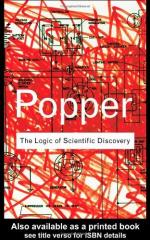
|
| Name: _________________________ | Period: ___________________ |
This quiz consists of 5 multiple choice and 5 short answer questions through Part II: Chapter 8, Probability.
Multiple Choice Questions
1. What plays a vitally important role in empirical science?
(a) Inferences.
(b) Probability.
(c) Research.
(d) Simplicity.
2. What type of numerical interpretation requires that probabilities be only expressed as frequencies?
(a) Psychological.
(b) Subjective.
(c) Non-empirical.
(d) Objective.
3. What comprises empirical science?
(a) Guides to explanations.
(b) Universal assumptions.
(c) Natural laws.
(d) Systems of theories.
4. What depends on both universal and singular statements?
(a) Causality.
(b) Logical factors.
(c) Correlations.
(d) Abstract thought.
5. What theory is based on random events?
(a) Normative theory.
(b) Random Theory.
(c) Subjective theory.
(d) Theory of chance.
Short Answer Questions
1. According to Popper, what philosophy ignores the hypothetical character of statistically derived estimates?
2. What refers to a term that does not need a definition but is learned through experience?
3. How must scientific statements be tested?
4. In order to validate his theory, what does Popper categorize regarding frequency theory?
5. Popper rejects perceptions because they tie into what type of principles?
|
This section contains 167 words (approx. 1 page at 300 words per page) |

|




